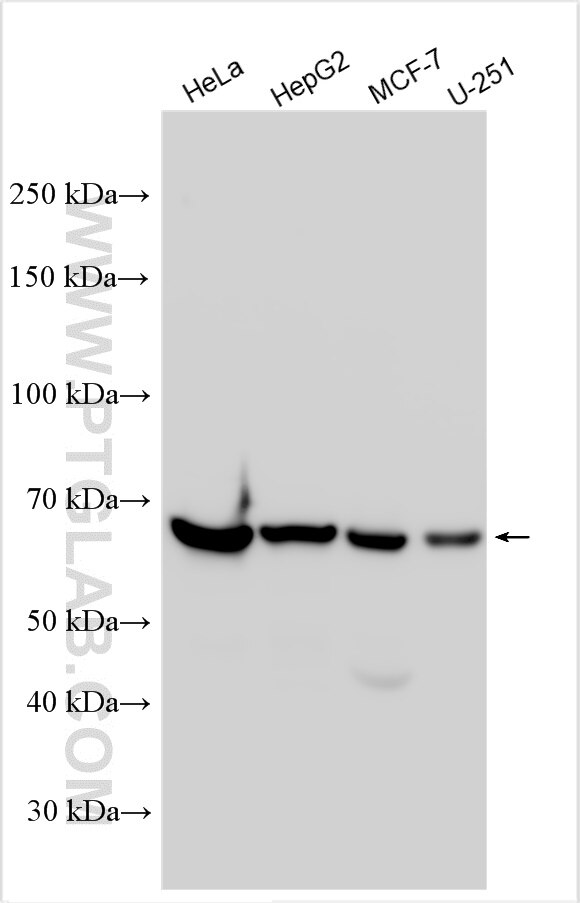TKTL1 Polyklonaler Antikörper
TKTL1 Polyklonal Antikörper für WB, ELISA
Wirt / Isotyp
Kaninchen / IgG
Getestete Reaktivität
human
Anwendung
WB, ELISA
Konjugation
Unkonjugiert
Kat-Nr. : 13819-1-AP
Synonyme
Geprüfte Anwendungen
| Erfolgreiche Detektion in WB | HeLa-Zellen, HepG2-Zellen, MCF-7-Zellen, U-251-Zellen |
Empfohlene Verdünnung
| Anwendung | Verdünnung |
|---|---|
| Western Blot (WB) | WB : 1:500-1:2000 |
| It is recommended that this reagent should be titrated in each testing system to obtain optimal results. | |
| Sample-dependent, check data in validation data gallery | |
Produktinformation
13819-1-AP bindet in WB, ELISA TKTL1 und zeigt Reaktivität mit human
| Getestete Reaktivität | human |
| Wirt / Isotyp | Kaninchen / IgG |
| Klonalität | Polyklonal |
| Typ | Antikörper |
| Immunogen | TKTL1 fusion protein Ag4913 |
| Vollständiger Name | transketolase-like 1 |
| Berechnetes Molekulargewicht | 65 kDa |
| Beobachtetes Molekulargewicht | 65 kDa |
| GenBank-Zugangsnummer | BC025382 |
| Gene symbol | TKTL1 |
| Gene ID (NCBI) | 8277 |
| Konjugation | Unkonjugiert |
| Form | Liquid |
| Reinigungsmethode | Antigen-Affinitätsreinigung |
| Lagerungspuffer | PBS with 0.02% sodium azide and 50% glycerol |
| Lagerungsbedingungen | Bei -20°C lagern. Nach dem Versand ein Jahr lang stabil Aliquotieren ist bei -20oC Lagerung nicht notwendig. 20ul Größen enthalten 0,1% BSA. |
Hintergrundinformationen
Transketolase (TKT) is an enzyme that is ubiquitously expressed in all living organisms and has been identified as an important regulator of cancer. The TKT family includes the TKT gene and two TKT-like (TKTL) genes; TKTL1 and TKTL2.The basic components ribose-5-phosphate and acetyl-CoA, which are formed by TKTL1, provide essential building blocks for the formation of new cells. TKTL1 also allows survival in the absence of oxygen (hypoxia).TKTL1 also has been shown to be involved in regulating neuronal development in the cerebral cortex.
Protokolle
| PRODUKTSPEZIFISCHE PROTOKOLLE | |
|---|---|
| WB protocol for TKTL1 antibody 13819-1-AP | Protokoll herunterladen |
| STANDARD-PROTOKOLLE | |
|---|---|
| Klicken Sie hier, um unsere Standardprotokolle anzuzeigen |


